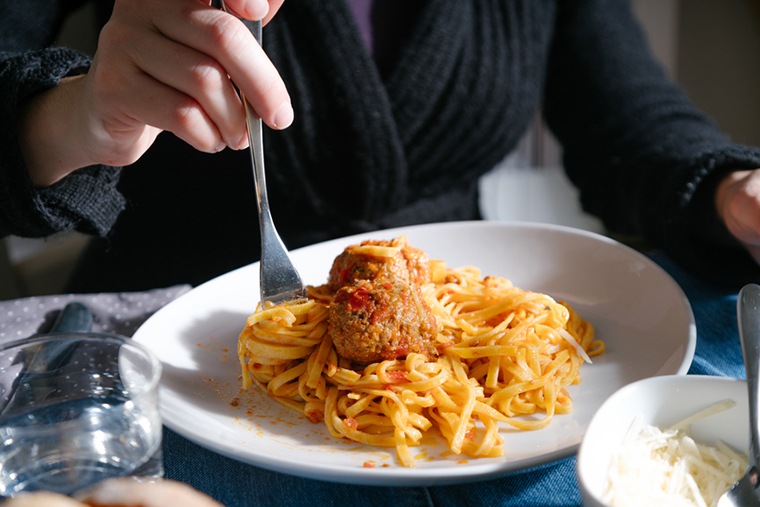If you have a bloat that won't quit (or if you're among the one in five Americans with irritable bowel syndrome, AKA IBS), switching to a low-FODMAP diet can be truly transformative. Sure, you have to weed out a super-long list of foods, but committing to it can put an end to a whole host of gut probs, including cramps, gas, and—real talk—less-than-ideal poop situations.
So if eliminating FODMAP foods is working, you should stick with it, right? No way, says Food Coach founder Dana James, CDN. "It's a treatment diet, and you're missing the point if that's the only way you can survive," says James.
James compares following a low-FODMAP diet to resolve your gut issues to restraining from sex to avoid getting a UTI.
The other sticking point for her? A lot of the foods that are off-limits are nutrient-dense (reminder: FODMAP stands for six different types of short-chain carbohydrates that are known for being poorly absorbed and hard to digest, which are present in a variety of foods, even fruits and vegetables—you have to say goodbye to healthy must-haves broccoli, cashew nuts, watermelon, and beets if you're going low-FODMAP), so the goal shouldn't be to avoid them long-term. "You need to find out the underlying issue."
James compares following a low-FODMAP diet to resolve your gut issues to restraining from sex to avoid getting a UTI: "It's an adaptive response, and you aren't getting to the heart of what the real problem is."
What could your low-FODMAP diet be hiding? Here's how to identify the exact issue that's bringing on the bloat.

The problem could be gluten or dairy only
James explains that of course cutting out FODMAP foods offers some relief—you're only eating things that are super easy to digest. But, she adds, "you really should get to the bottom of why you're having trouble digesting foods [in the first place], so you can work toward being able to eat them again."
The issue could really just be with gluten or dairy (or both). Many people make the mistake of going full-on low-FODMAP, she says, when you might get that bloat-free life by just avoiding those two inflammatory food groups alone.

{{post.sponsorText}}
While better-for-you FODMAP foods like fruits and veggies should only be eliminated for a short time, James is totally fine with people cutting ties with gluten and dairy for good, if that's what makes your digestive tract healthy and happy.

Finding your (gut) balance
What if you cut gluten and dairy and are still experiencing GI drama? James says that more often than not, there's an overgrowth of bacteria in the small intestine or large colon. "That can lead to some very uncomfortable bloating when you eat foods with fiber," she says.
She explains that you really don't want a lot of bacteria in the small intestine or large colon (unlike in the gut). "If you experience an upset stomach, it's either caused by a certain food or there's a microbe triggering it," she says. Another problem that could be going on is not having enough stomach acid in the gut. If you tend to reach for Tums or Rolaids on the reg, it could cause an unhealthy acid depletion.
To figure out exactly what's causing your bloating, constipation, or other digestive issues—and to eventually get off a low-FODMAP diet—you have to work with a doctor who can run specific tests. Most likely, your MD will administer a Small Intestinal Bacteria Overgrowth (SIBO) test, which measures the amount of hydrogen and methane in the gut—AKA gas—caused by bacteria.
Once you know exactly what's going on, you can work together to come up with a plan that will work for your body, such as taking hydrochloric acid—a chemical released in the stomach during digestion that helps break down food—or a probiotic with specific bacterial strains that your body needs.

Seeing the bigger picture
Here's the tricky thing: SIBO can be a reoccurring problem—it's not a one-and-done treatment type of deal. "It can keep coming back, and the most common reason people get it in the first place is because the body is under stress," James says. (What isn't stress the cause of?)
So yes, working with a physician to determine what supplements will help bring back balance to the gut is important, but so is looking at the bigger picture—AKA how you can manage your stress. "You would be surprised how much bloating can happen just because of the mind," James says. "It literally changes the microflora in the gut." The plus side? It changes for the better quickly, too, so the effects of getting stress under control in the mind has an immediate effect for the better on the gut.
Figuring out the root cause of any gut problems can feel overwhelming, but knowing the low-FODMAP Diet is just a Band-Aid should come as a relief. Who wants to give up apples, watermelon, and (gasp!) avocados forever?
To help you get your system humming again, here are nine secrets from Ayurveda that are great for digestion. And the most fun way to boost your gut health? Get out in that summer sun.
Loading More Posts...